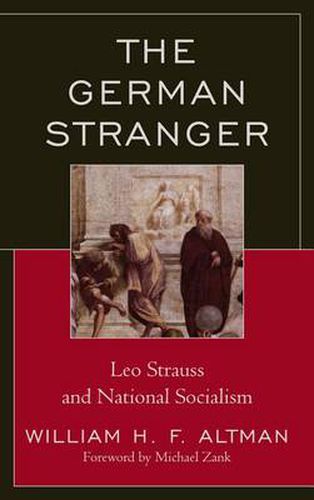Readings Newsletter
Become a Readings Member to make your shopping experience even easier.
Sign in or sign up for free!
You’re not far away from qualifying for FREE standard shipping within Australia
You’ve qualified for FREE standard shipping within Australia
The cart is loading…






This title is printed to order. This book may have been self-published. If so, we cannot guarantee the quality of the content. In the main most books will have gone through the editing process however some may not. We therefore suggest that you be aware of this before ordering this book. If in doubt check either the author or publisher’s details as we are unable to accept any returns unless they are faulty. Please contact us if you have any questions.
Leo Strauss’s connection with Martin Heidegger and Carl Schmitt suggests a troubling proximity to National Socialism but a serious critique of Strauss must begin with F. H. Jacobi. While writing his dissertation on this apparently Christian opponent of the Enlightenment, Strauss discovered the tactical principles that would characterize his lifework: writing between the lines, a faith-based critique of rationalism, the deliberate secularization of religious language for irreligious purposes, and an all or nothing antagonism to middling solutions. Especially the latter is distinctive of his Zionist writings in the 1920s where Strauss engaged in an ongoing polemic against Cultural Zionism, attacking it first from an orthodox, and then from an atheist’s perspective. In his last Zionist article (1929), Strauss mentions the Machiavellian Zionism of a Nordau that would not fear to use the traditional hope for a Messiah as dynamite. By the time of his change of orientation, National Socialism was being led by a nihilistic Messiah while Strauss had already radicalized Schmitt’s political theology and Heidegger’s deconstruction of the ontological Tradition. Central to Strauss’s advance beyond the smartest Nazis is his Second Cave in which he claimed modern thought is imprisoned: only by escaping Revelation can we recover natural ignorance. By using pseudo-Platonic imagery to illustrate what anti-Semites called Jewification, Strauss attempted to annihilate the common ground, celebrated by Hermann Cohen, between Judaism and Platonism. Unlike those who attacked Plato for devaluing nature at the expense of the transcendent Idea, the emigre Strauss effectively employed a new Plato who was no more a Platonist than Nietzsche or Heidegger had been. Central to Strauss’s Platonic political philosophy is the mysterious protagonist of Plato’s Laws whom Strauss accurately recognized as the kind of Socrates whose fear of death would have caused him to flee the hemlock. Any reader who recognizes the unbridgeable gap between the real Socrates and Plato’s Athenian Stranger will understand why the German Stranger is the principal theoretician of an atheistic re-enactment of religion, of which genus National Socialism is an ultra-modern species.
$9.00 standard shipping within Australia
FREE standard shipping within Australia for orders over $100.00
Express & International shipping calculated at checkout
Stock availability can be subject to change without notice. We recommend calling the shop or contacting our online team to check availability of low stock items. Please see our Shopping Online page for more details.
This title is printed to order. This book may have been self-published. If so, we cannot guarantee the quality of the content. In the main most books will have gone through the editing process however some may not. We therefore suggest that you be aware of this before ordering this book. If in doubt check either the author or publisher’s details as we are unable to accept any returns unless they are faulty. Please contact us if you have any questions.
Leo Strauss’s connection with Martin Heidegger and Carl Schmitt suggests a troubling proximity to National Socialism but a serious critique of Strauss must begin with F. H. Jacobi. While writing his dissertation on this apparently Christian opponent of the Enlightenment, Strauss discovered the tactical principles that would characterize his lifework: writing between the lines, a faith-based critique of rationalism, the deliberate secularization of religious language for irreligious purposes, and an all or nothing antagonism to middling solutions. Especially the latter is distinctive of his Zionist writings in the 1920s where Strauss engaged in an ongoing polemic against Cultural Zionism, attacking it first from an orthodox, and then from an atheist’s perspective. In his last Zionist article (1929), Strauss mentions the Machiavellian Zionism of a Nordau that would not fear to use the traditional hope for a Messiah as dynamite. By the time of his change of orientation, National Socialism was being led by a nihilistic Messiah while Strauss had already radicalized Schmitt’s political theology and Heidegger’s deconstruction of the ontological Tradition. Central to Strauss’s advance beyond the smartest Nazis is his Second Cave in which he claimed modern thought is imprisoned: only by escaping Revelation can we recover natural ignorance. By using pseudo-Platonic imagery to illustrate what anti-Semites called Jewification, Strauss attempted to annihilate the common ground, celebrated by Hermann Cohen, between Judaism and Platonism. Unlike those who attacked Plato for devaluing nature at the expense of the transcendent Idea, the emigre Strauss effectively employed a new Plato who was no more a Platonist than Nietzsche or Heidegger had been. Central to Strauss’s Platonic political philosophy is the mysterious protagonist of Plato’s Laws whom Strauss accurately recognized as the kind of Socrates whose fear of death would have caused him to flee the hemlock. Any reader who recognizes the unbridgeable gap between the real Socrates and Plato’s Athenian Stranger will understand why the German Stranger is the principal theoretician of an atheistic re-enactment of religion, of which genus National Socialism is an ultra-modern species.